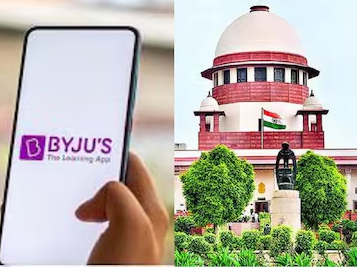1. Introduction
SC Sets Aside a significant ruling that has reverberated throughout the Indian legal and business landscape, the Supreme Court of India has set aside the relief granted by the National Company Law Appellate Tribunal (NCLAT) to Byju’s, a prominent ed-tech firm. The decision, presided over by Chief Justice of India D. Y. Chandrachud, highlights critical concerns regarding procedural irregularities in how the case was brought before the NCLAT. This article delves into the implications of this ruling, examining the circumstances surrounding the case, SC Sets Aside the legal arguments presented, and the potential impact on Byju’s and the ed-tech sector as a whole.
2. Background of the Case
2.1. Byju’s and Its Business Model
Founded in 2011 by Byju Raveendran, Byju’s has quickly risen to become one of India’s leading ed-tech companies, revolutionizing the way students learn through its digital platform. With a valuation exceeding $21 billion, the company has expanded its offerings to include a variety of courses, from K-12 education to competitive exam preparation.
2.2. The Dispute with BCCI
The heart of the controversy lies in a financial settlement between Byju’s and the Board of Control for Cricket in India (BCCI). Byju’s was involved in a ₹158-crore settlement that raised eyebrows and sparked concerns among stakeholders regarding its financial practices and compliance with corporate governance norms.

3. The Role of NCLAT
3.1. What is NCLAT?
The NCLAT serves as an appellate authority for disputes arising under the Insolvency and Bankruptcy Code and the Companies Act,SC Sets Aside among other legislations. It is tasked with ensuring that corporate entities operate within the legal framework and adhere to standards of corporate governance.
3.2. The Initial Relief Granted to Byju’s
In a previous ruling, the NCLAT granted Byju’s relief, SC Sets Aside allowing the ₹158-crore settlement to proceed. This decision was met with mixed reactions from various stakeholders, particularly given the potential implications for corporate governance and financial transparency.
4. Supreme Court’s Ruling
4.1. Grounds for Setting Aside the NCLAT Decision
Chief Justice D. Y. Chandrachud pointed out “grave deviations from procedure” in the manner the case was escalated to the NCLAT. He emphasized the importance of adhering to proper legal protocols, especially in matters involving substantial financial transactions and settlements.
4.2. Implications of the Ruling
The Supreme Court’s decision to set aside the NCLAT’s relief carries significant ramifications for Byju’s. It raises questions about the company’s financial management practices and highlights the necessity for robust governance structures within rapidly growing firms.
5. Stakeholder Reactions
5.1. Response from Byju’s
In the aftermath of the ruling, SC Sets Aside Byju’s issued a statement expressing disappointment but emphasized its commitment to complying with legal requirements and corporate governance standards.
5.2. Industry Perspectives
Industry experts have weighed in on the ruling, suggesting that it could serve as a wake-up call for other startups in the ed-tech space and beyond. The necessity for transparent financial practices and adherence to legal frameworks has never been more pressing.
6. The Bigger Picture: Corporate Governance in India
6.1. Importance of Governance
The ruling shines a light on the broader issue of corporate governance in India, SC Sets Aside particularly within high-growth sectors like ed-tech. Effective governance is crucial for ensuring accountability and building trust among investors and consumers.
6.2. Regulatory Framework
The legal landscape surrounding corporate governance in India is complex and often evolving. This case underscores the need for startups to not only focus on growth but also to implement robust governance structures that can withstand scrutiny.
7. Future Prospects for Byju’s
7.1. Navigating Challenges
Moving forward, SC Sets Aside will face the challenge of rebuilding trust with stakeholders and ensuring compliance with regulatory standards. This ruling could necessitate a reevaluation of its financial strategies and governance practices.
7.2. Potential Impact on Growth
The implications of this ruling may influence Byju’s growth trajectory, particularly in its dealings with investors and partners. As the ed-tech landscape becomes increasingly competitive, SC Sets Aside maintaining transparency and accountability will be paramount.
8. Conclusion
The Supreme Court’s decision to set aside the NCLAT relief for Byju’s serves as a pivotal moment for the ed-tech giant and the broader corporate ecosystem in India. It underscores the critical importance of adhering to procedural norms and maintaining robust governance structures. As Byju’s navigates the aftermath of this ruling, the broader industry must take heed of the lessons learned, prioritizing transparency and accountability in an increasingly complex regulatory environment. ALSO READ:-Middle-Order Spot and Pune Track: The Crucial Choices for India Ahead of the Second Test 2024